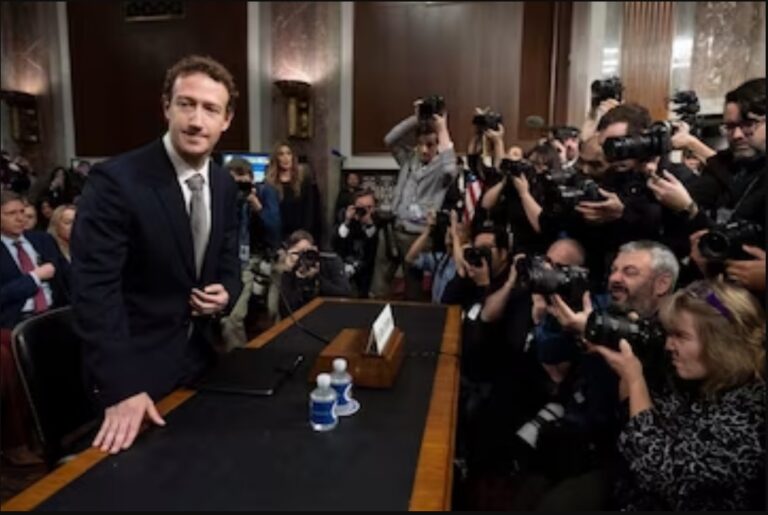News Desk, Kolkata : In an unscripted Senate hearing that unfolded with gripping intensity, Meta’s CEO, Mark Zuckerberg, found himself compelled to address the heart-wrenching plight of parents whose children had fallen victim to the dark side of social media. The emotional scene, which took an unexpected turn on Wednesday, saw Zuckerberg extend a public apology to those families whose lives were marred by exploitation, bullying, and even self-harm facilitated through online platforms.
As the hearing commenced, Zuckerberg and other tech giants, including the chief executives of TikTok, X, Snap, and Discord, found themselves under the Senate’s scrutiny. The focus was on what measures these companies were taking to safeguard children from the perils of the digital realm.
Amidst a tense exchange with Republican Senator Josh Hawley, who vehemently criticized Zuckerberg, an unscripted moment unfolded. Hawley pressed Zuckerberg to apologize directly to the victims and their families, prompting an unexpected and heartfelt response.
“I’m sorry for everything you have all been through. No one should go through the things that your families have suffered, and this is why we invest so much, and we are going to continue doing industry-wide efforts to make sure no one has to go through the things your families have had to suffer,” Zuckerberg declared, addressing the parents in a poignant moment.
This spontaneous apology marked a departure from the corporate tone that typically dominates such hearings. The atmosphere was charged as families held up pictures of their children, vividly illustrating the tangible impact of the online harms discussed.
Zuckerberg’s shift from the hot seat to a moment of empathy underscored the gravity of the issues at hand. However, the CEO swiftly returned to a more composed stance, reiterating Meta’s commitment to ongoing investments in “industry-wide” initiatives aimed at protecting children online.
The hearing unfolded against a backdrop of a powerful video presentation where children shared personal accounts of being bullied on various social media platforms. Senators recounted harrowing stories of young lives lost to suicide after falling victim to extortion schemes fueled by interactions with sexual predators online.
Senator Hawley, in a particularly charged moment, accused Zuckerberg directly, stating, “Your product is killing people.” The accusation hung heavily in the air, emphasizing the weight of responsibility placed on tech companies to address the darker aspects of their platforms.
As the hearing progressed, it became clear that the testimonies aimed not only to hold tech executives accountable but also to shed light on the urgent need for comprehensive measures to protect vulnerable users, particularly children, from the dangers lurking online.
The narrative took a compelling turn as senators delved into the intricate challenges faced by platforms like Facebook and Instagram, both owned by Meta. The spotlight intensified on Zuckerberg, who found himself navigating a complex web of questions surrounding content moderation, user safety, and corporate responsibility.
The real-time drama unfolded not just within the confines of the Senate chamber but played out on live television, ensuring that the emotional exchanges and unscripted moments resonated with a wider audience. The faces of grieving parents, coupled with Zuckerberg’s rare display of public contrition, added a human dimension to the ongoing debate about the role and impact of social media.
In the aftermath of the hearing, media outlets seized upon the emotional apex, broadcasting and dissecting Zuckerberg’s apology and the broader implications for the tech industry. Public opinion swirled as discussions on social media platforms themselves became a focal point, with users engaging in passionate conversations about the responsibilities of these platforms and the toll they may exact on vulnerable individuals.
The hearing, with its unanticipated emotional twists and a CEO’s apology, became a pivotal moment in the ongoing dialogue about online safety. The aftermath would inevitably shape future discussions, regulations, and corporate policies as the tech industry grappled with the profound implications of its creations on the lives of those it impacts most profoundly – the users.
DISCLAIMER
Our news media denounces any form of bias and disapproves of sensationalism. The disseminated news is entirely educational and aimed at social awareness. Our media maintains absolute impartiality, adhering solely to the purpose of education and social consciousness.


